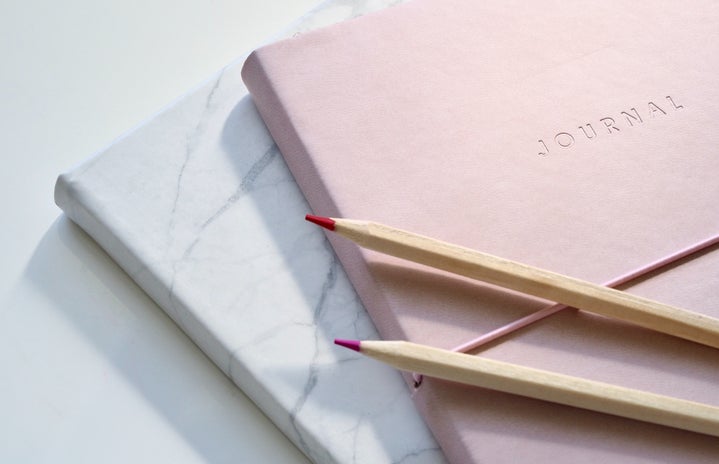Have you ever been so stressed that your body seems to have an allergic reaction to your thoughts? Stress and anxiety have a funny way of popping into our everyday lives without us even realizing it. Our bodies are constantly reacting to things happening outside of it. When our brains struggle to keep up with our daily lives, it often results in physical signals.
I classify myself as a fairly anxious person, constantly aware of the things I need to do and fearful that they won’t be done to the best of my ability. These days it seems like professors throw the entire curriculum at me, or there isn’t enough time in the day; my body immediately reacts in a very unhealthy way. I first noticed it as I started my first semester at Virginia Tech last fall. I started taking notes of all the unhealthy ways my body was coping with the stress I was putting my mind through.
Common everyday habits and anxiety based habits can be similar, but anxiety based habits come out in extreme situations. Anxiety based habits can be common habits, but common habits aren’t always anxiety based. For example, many people bite or pick at their nails. But for me, when it becomes a stress induced quirk, I spend weeks taking care of my nails and perfecting them. When the stress piles up I tear at them until they bleed, oftentimes leading me to feel guilty for the aggravation I took out on my hands.
Another common but terribly unhealthy way of coping is scratching. Scratching and picking at your skin is a type of fidgeting that allows for an emotional release in a physical sense. I found that during exam week, I scratched and rubbed my lower thighs until I gave myself a stress induced rash. I see this habit in others as well. After talking with my boyfriend about anxiety related habits, I found he scratches his scalp until he leaves scars. This hurt me as a girlfriend because he’s so stressed he is tearing at his body. He quickly pointed out that I don’t feel the same sadness when it comes to my bad habits. This is due to the fact that I don’t value my body and mental as much as I value his.
There are also subconscious habits that I had no clue I had until I really focused in on my mental state. When having a good day I am very talkative and check in with those I love, but when the anxiety takes over, I withdraw. There were times I would go a week or two without responding to any texts or snapchats. I did this because I was worried that reading or responding to anyone would increase my anxiety, which is not true. Finding someone to talk about with the thoughts in my head is what allows for a release. Secluding myself from those who love me will not help me overcome my intrusive thoughts.
A habitual thought process can also show itself in times of high stress and anxiety. I sat and talked with my closest girlfriends, and we found that all of us would limit the amount of food we consumed until our work was done. Using food as a reward system can rapidly become toxic. For women specifically, it can lead to eating disorders and a toxic relationship with food. Fasting until work is finished makes it harder for the brain to perform at its full capacity while producing mediocre results. Food is not a reward, it is a necessity.

When self reflecting over Winter break, I found that all these habits or quirks were my way of taking my anger, stress, anxiety, and aggravation out on myself. It was a way for me to punish myself for not performing up to what I thought was my full potential. My emotions of stress, worry, and anger were my fault and my mind was hurting my physical body as punishment. While noticing these habits, I find it is hard to stop once I start.
I found that these habits weren’t helpful, but a hindrance. My greatest fear is mediocre work and these habits were causing me to produce mediocre results, causing more anxiety and stress. Naturally I was frustrated with my brain after observing and developing an understanding with these habits. So, how do we break them?
Self reflection is a key part in growth as an individual. Being able to look at yourself through a realistic perspective is one of the most difficult parts of self reflection. You will always be biased toward yourself, and as women we are often harder on ourselves than anyone else. Allowing yourself to acknowledge your hard work is often looked at as egotistic or unappealing for women, but I can assure, you are doing a phenomenal job. It is okay to see your downfalls and still feel as though you are putting your best foot forward. At the end of the day you must be able to look in the mirror and say to yourself: “You are trying. You are doing your best. I am proud of you.”
I highly recommend saying those words out loud to yourself daily. I began saying them to myself as my New Year’s resolution. I have seen so much improvement in how I react to stress in just a month. As the spring semester starts, use the resources available to you to put your health first. This may be in the form of opening up to close friends and having someone to hold you accountable. It could also be meditation, a great way to take control of your thoughts. Maybe it’s time to see what therapy options are available. During this pandemic, take care of both your mind and body.



